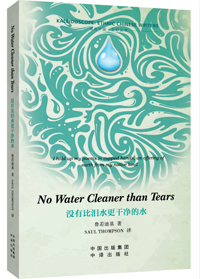No Water Cleaner than Tears

No Water Cleaner than Tears
内容介绍
About the autor:
Luruo Diji is a writer of the Pumi ethnicity. He hails from Ninglang county in Yunnan province, where he was born in 1967. His prizes and awards include: the Jun Ma prize for literature by ethnic minority writers, the People's Literature magazine prize for outstanding poetry, the prize for Chinese language poetry in its inaugural year, and the nomination prize for poets at the third session of the annual Grand prize for Chinese Literature and Media, among others.
About the book:
"I was born on Yunnan province's high, red earth plateau, where the Little Liang Mountains stretch far into the north western distance. Here, the pounding Jinsha river thunders through gorges, the Yulong Snow Mountain pierces heaven, and here also is beautiful Lugu Lake, whose waters stir deep currents in all those who look on her."
This poet's People is a small one; the Pumi ethnicity numbers only around thirty thousand people in total. His home is a village named Guoliu, which nestles beneath Mount Sibujiong in the Little Liang Mountain range, at the edge of Lugu Lake. His father drives horse caravans along the ancient 'Tea Horse Road', a trade route between horse-rich Tibet and Yunnan's tea-producing jungle regions. The poet introduces his mother as the Queen of Guoliu village, a lady feted for her ability to sing more Pumi folk-songs than there are stars in the sky. Luruo says he is a completely ordinary child of his land, just one among many others like him. He also calls himself a child of fortune - for him, it is a great blessing to make a livelihoods composing verse in his native place. The fount of his good fortune is the ethereal vitality of the land that he so loves, and which has given him life, and poems.
Yunnan poet Luruo Diji writes in beautifully arranged Mandarin Chinese, but his poetry has its source on the distant periphery of the Chinese cultural world; his poems take form in the red earth of the high plateau, in the lofty borderlands of southwest China, a region moulded by unrestrained acts of nature. His People, the Pumi ethnic minority, are long-time residents of a unique natural landscape bordering both the Himalaya Mountains and deep sub-tropical jungles, home to giant snow-mountains and steep gorges, where the upper reaches of the Yangzi River rage and thunder. Many of the poems in this book take place among these great natural formations, dipping in and out of stories of the people that live there, the impressions they left on the land for a moment.
Luruo often presents his poems as material pieces of his homeland, the fine earth crumblings of the land's inspiration passed through his hands, laid on the page. This collection is an emotional tribute to one of China's most stunning wildernesses, by one of its children.
Luruo Diji is a writer of the Pumi ethnicity. He hails from Ninglang county in Yunnan province, where he was born in 1967. His prizes and awards include: the Jun Ma prize for literature by ethnic minority writers, the People's Literature magazine prize for outstanding poetry, the prize for Chinese language poetry in its inaugural year, and the nomination prize for poets at the third session of the annual Grand prize for Chinese Literature and Media, among others.
About the book:
"I was born on Yunnan province's high, red earth plateau, where the Little Liang Mountains stretch far into the north western distance. Here, the pounding Jinsha river thunders through gorges, the Yulong Snow Mountain pierces heaven, and here also is beautiful Lugu Lake, whose waters stir deep currents in all those who look on her."
This poet's People is a small one; the Pumi ethnicity numbers only around thirty thousand people in total. His home is a village named Guoliu, which nestles beneath Mount Sibujiong in the Little Liang Mountain range, at the edge of Lugu Lake. His father drives horse caravans along the ancient 'Tea Horse Road', a trade route between horse-rich Tibet and Yunnan's tea-producing jungle regions. The poet introduces his mother as the Queen of Guoliu village, a lady feted for her ability to sing more Pumi folk-songs than there are stars in the sky. Luruo says he is a completely ordinary child of his land, just one among many others like him. He also calls himself a child of fortune - for him, it is a great blessing to make a livelihoods composing verse in his native place. The fount of his good fortune is the ethereal vitality of the land that he so loves, and which has given him life, and poems.
Yunnan poet Luruo Diji writes in beautifully arranged Mandarin Chinese, but his poetry has its source on the distant periphery of the Chinese cultural world; his poems take form in the red earth of the high plateau, in the lofty borderlands of southwest China, a region moulded by unrestrained acts of nature. His People, the Pumi ethnic minority, are long-time residents of a unique natural landscape bordering both the Himalaya Mountains and deep sub-tropical jungles, home to giant snow-mountains and steep gorges, where the upper reaches of the Yangzi River rage and thunder. Many of the poems in this book take place among these great natural formations, dipping in and out of stories of the people that live there, the impressions they left on the land for a moment.
Luruo often presents his poems as material pieces of his homeland, the fine earth crumblings of the land's inspiration passed through his hands, laid on the page. This collection is an emotional tribute to one of China's most stunning wildernesses, by one of its children.
All rights reserved by China Translation Publish House
Add: Floor 6 Wuhua Building, A4 Chegongzhuang Street, Xicheng District, Beijing 100044, China. Email: ctph@ctph.com.cn
